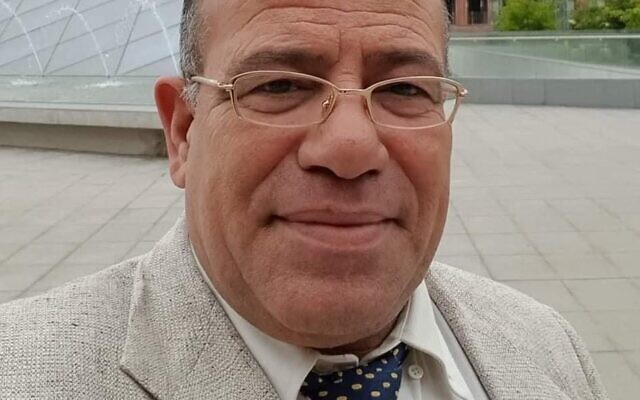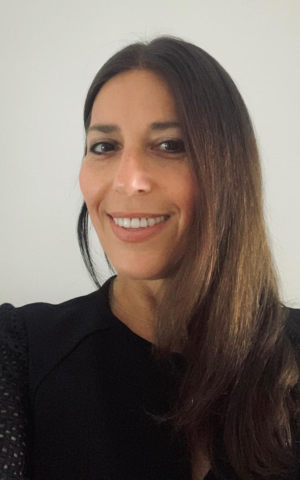Palestinian Human Rights Activist Praises Israel
Bassem Eid was once arrested by the Palestinian Authority, but never by Israel.

East Jerusalem resident Bassem Eid built his worldwide reputation as a human rights activist by reporting on abuses by the Israeli authorities. It was only in 1994, after the Palestinian Authority was created and empowered to govern the Palestinians in the West Bank and Gaza, that Eid turned his focus to the human rights abuses of the Palestinian leadership.
It was the latter part of Eid’s life that was spotlighted in a Zoom conference sponsored by the Atlanta Israel Coalition and The Weber School Rams for Israel Oct. 18. During the hour-long conversation, Eid spoke about the controversial Boycott, Divestment and Sanctions Movement, the move of the U.S. Embassy to Jerusalem and the Hamas leadership in Gaza.
Prior to the event, AIC founding executive director Cheryl Dorchinsky told the AJT that Eid would be “open to any questions,” and indeed, he was showered with queries about his life, about the Palestinian educational system and textbooks, and about how college students on American campuses should respond to organizations that criticize Israel.
The latter questions came from Weber Hebrew teacher and Rams advisor Michal Ilai and Weber student Carly Spandorfer.

Ein responded, “I have visited college campuses and I feel the Israeli-Palestinian conflict more on college campuses than in [Palestinian West Bank city] Ramallah and Jerusalem, and I wonder why you’re fighting in the United States. Don’t you have problems in the United States?” he joked.
Eid, who grew up in the Shuafat refugee camp where several siblings still live, started his career as a journalist and then became a senior field researcher for B’Tselem, the Israeli Information Center for Human Rights in the Occupied Territories. While with B’Tselem, Eid was arrested by the Palestinian Authority after he started monitoring Palestinian human rights violations. After only 25 hours, he was released after appeals to then PA Chairman Yassir Arafat by former U.S. Secretary of State Warren Christopher and Israeli Prime Minister Shimon Peres.
“I am a lucky person,” Eid told Atlantans. “During my arrest, the PA realized that I am an international figure, not a local figure. The PA considers me a fact on the ground.”
Eid pointed out that he’s never been arrested by Israel, even during the more than seven years he worked for B’Tselem. “Nobody can deny that Israel is the only democracy in the Middle East,” he said. “The Israeli media gives me a huge stage from which to criticize human rights violations. The life of a Palestinian under Israelis is much better than in any other country of the world.”
Eid spoke about the warming relationships between Israel and some of the Gulf states like the United Arab Emirates and Bahrain. “Israel doesn’t look like 20 years ago today. It’s not isolated from Arab countries.” The world needs technology and security, he said, and “that’s what Israel has.”
Spandorfer asked Eid how his family handles his being an outspoken opponent of the Palestinian Authority. According to Eid, they tell him: “You are the voice of those who don’t have voices.”

In 1996, he founded Jerusalem-based Palestinian Human Rights Monitoring Group. Two decades later, he became the chairman of the Center for Near East Policy Research. Today, he said, he is a “completely independent person” and refuses to be associated with any organization. “I try to keep a distance from political organizations.”
However, he does urge the leaders of the world to put pressure on the “Arab leadership.” He called the latter, a “handicapped leadership.”
The younger Palestinian generation is more violent than previous generations, he said but “people today care more about their economic situation than politics. Their economic situation is getting worse.”
In addition to the Weber Rams, the “Israel Today” program had about 15 local Jewish organizational partners, including several synagogues, Hillels of Georgia, B’nai B’rith and the Israeli American Council. According to Dorchinsky, a few hundred participants from around the world listened to the program, with more expected to view it on the YouTube channel once it was posted on AIC’s Facebook page.
- Israel
- Palestine
- Human Rights
- Jerusalem
- Bassem Eid
- Palestinian authority
- West Bank
- Gaza
- Atlanta Israel Coalition
- The Weber School
- BDS Movement
- U.S. Embassy
- hamas
- Cheryl Dorchinsky
- Michal Ilai
- Carly Spandorfer
- Israeli-Palestinian conflict
- Israeli Information Center for Human Rights in the Occupied Territories
- Yassir Arafat
- Shimon Peres
- Warren Christopher
- B’Tselem
- Middle East
- Jan Jaben-Eilon



comments